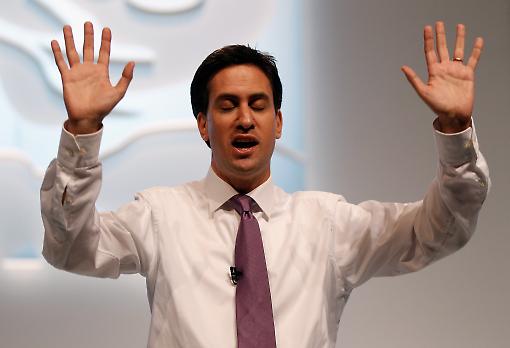Members of the shadow cabinet don’t trust their leader to cover their backs, says Dan Hodges.
BY DAN HODGES PUBLISHED 26 MARCH 2013 16:51
So much for unity. On 19 March, Ed Miliband experienced the most damaging parliamentary rebellion of his leadership so far, when 43 Labour MPs defied the whip and voted against the Jobseekers Bill, which enables the government to withdraw benefits from those refusing to participate in the Work Programme.

On the surface, it looks like the standard fisticuffs between the hard left and the Labour leadership. Glance at the names of the rebels, however, and it soon becomes clear that these were not your daddy’s usual suspects. Gerry Sutcliffe, John Healey and Nick Brown were just three of those who defied their leader’s order to abstain and voted against the legislation.
Fault lines are widening between Miliband, his shadow cabinet, the Parliamentary Labour Party and his party activists. They have existed since Miliband’s election but his shift to the left, a succession of coalition crises and Labour’s stalled programme of policy development masked them. Not any more. No sooner had the rebels set foot in the division lobbies than what one Labour MP described as “Ed’s teenage outriders” began opening up on members of Miliband’s shadow cabinet.
They are aware that Miliband’s office has been courting Jones and Hundal.
The suspicion is forming that whenever Miliband faces a backlash, individual shadow cabinet members will find themselves pressed into service as human shields, protecting their leader from criticism.
Much has been made in recent months about Labour’s “policy vacuum”. Less attention has been focused on its difficulty in holding the line on policies that have already been unveiled.
In the wake of the recent debacle, Byrne wrote what was in effect a mea culpa for LabourList. Acknowledging that the party’s “decision not to support the bill in the Commons but to abstain was very, very difficult”, he meekly concluded: “I think we made the right call.” Yet in January, Ed Balls was placing welfare sanctions – which the Work Programme seeks to enshrine – at the very heart of his “tough but fair” jobs guarantee.
A vicious circle is forming. Policy is announced. It generates a backlash. Miliband ducks for cover. His “outriders” start picking targets among the shadow cabinet. The shadow cabinet dives for cover. A vacuum develops.
Meanwhile, suspicion is increasing. Members of the shadow cabinet don’t trust their leader to cover their backs. The leader doesn’t trust them to cover his.
Labour MPs see a lack of authority and begin to act in their own interests – interests increasingly defined by activists, who see a leadership prepared to back down whenever they flex their muscles.
Unity may be strength but, in Miliband’s Labour Party, it is only skin-deep.

On the Labour Party Campaign Against the Bedroom Tax: Joint Statement and Petition by DPAC and Black Triangle Anti-Defamation Campaign in Defence of Disability Rights Posted on March 19, 2013
Labour abstention on workfare bill prompts party infighting Posted on March 22, 2013
Labour in secret deal with Iain Duncan Smith on benefit sanctions – Michael Meacher MP Posted on March 24, 2013
Work makes you free Posted on March 23, 2013

Ed Miliband. Photograph: Getty Images
On the surface, it looks like the standard fisticuffs between the hard left and the Labour leadership. Glance at the names of the rebels, however, and it soon becomes clear that these were not your daddy’s usual suspects. Gerry Sutcliffe, John Healey and Nick Brown were just three of those who defied their leader’s order to abstain and voted against the legislation.
Fault lines are widening between Miliband, his shadow cabinet, the Parliamentary Labour Party and his party activists. They have existed since Miliband’s election but his shift to the left, a succession of coalition crises and Labour’s stalled programme of policy development masked them. Not any more. No sooner had the rebels set foot in the division lobbies than what one Labour MP described as “Ed’s teenage outriders” began opening up on members of Miliband’s shadow cabinet.
“Labour will never offer a coherent alternative to the Tories so long as the likes of Liam Byrne wields influence,”the Independent’s Owen Jones wrote.
“It is a question and a challenge for Jon Cruddas,”wrote Sunny Hundal on the Liberal Conspiracy website.
“Will he take on Liam Byrne’s failed policies of the past or let him continue and take Labour into the ditch . . . again?”The attacks did not go unnoticed by some of Byrne’s and Cruddas’s colleagues.
They are aware that Miliband’s office has been courting Jones and Hundal.
The suspicion is forming that whenever Miliband faces a backlash, individual shadow cabinet members will find themselves pressed into service as human shields, protecting their leader from criticism.
Much has been made in recent months about Labour’s “policy vacuum”. Less attention has been focused on its difficulty in holding the line on policies that have already been unveiled.
In the wake of the recent debacle, Byrne wrote what was in effect a mea culpa for LabourList. Acknowledging that the party’s “decision not to support the bill in the Commons but to abstain was very, very difficult”, he meekly concluded: “I think we made the right call.” Yet in January, Ed Balls was placing welfare sanctions – which the Work Programme seeks to enshrine – at the very heart of his “tough but fair” jobs guarantee.
A vicious circle is forming. Policy is announced. It generates a backlash. Miliband ducks for cover. His “outriders” start picking targets among the shadow cabinet. The shadow cabinet dives for cover. A vacuum develops.
Meanwhile, suspicion is increasing. Members of the shadow cabinet don’t trust their leader to cover their backs. The leader doesn’t trust them to cover his.
Labour MPs see a lack of authority and begin to act in their own interests – interests increasingly defined by activists, who see a leadership prepared to back down whenever they flex their muscles.
Unity may be strength but, in Miliband’s Labour Party, it is only skin-deep.
Black Triangle Comment:
Not so sure that we see a leadership prepared to ‘back-down’! Where’s the evidence? It’s still neoliberal ‘Progress’ faction all the way as far as we can see! But we will be unrelenting in our attacks on Labour while they attack sick and/or disabled people in particular and the 99% in general! Policy must radically change NOW. Solidarity!

Eleanor Firman of Disabled People Against Cuts DPAC and John McArdle of Black Triangle reading out the joint statement signed by 1,100 individual members of the public and campaigning organisations (36 pages of signatories!) on Monday 25th March 2013 at Southwark, South London
Black Triangle’s Joe Kane WRITES:
‘Dan Hodges, Telegraph columnist who voted for Boris Johnston in the London Mayor election, wants the kind of unity whereby careerist Tory neoliberals like himself can take over the Labour Party without a struggle.
‘Fortunately, Westminster Parliamentary Labour members such as John McDonnell, Tom Watson and Jeremy Corbyn have different ideas as to who they want unity with, and it doesn’t involve uniting with Thatcherite parasites, like Hodges.’
The Daily Telegraph: Dan Hodges
‘Dan Hodges is a Blairite cuckoo in the Miliband nest. He has worked for the Labour Party, the GMB trade union and managed numerous independent political campaigns. He writes about Labour with tribal loyalty and without reservation. He is on Twitter at @dpjhodges.’
Sources:
http://blogs.telegraph.co.uk/news/author/danhodges/
http://en.wikipedia.org/wiki/Dan_Hodges
Backstory
Labour abstention on workfare bill prompts party infighting Posted on March 22, 2013
Labour in secret deal with Iain Duncan Smith on benefit sanctions – Michael Meacher MP Posted on March 24, 2013
Work makes you free Posted on March 23, 2013
OWEN JONES: Workfare ~ Why did so many Labour MPs accept this brutal, unforgivable attack on vulnerable people? Posted on March 22, 2013
Posted on March 22, 2013